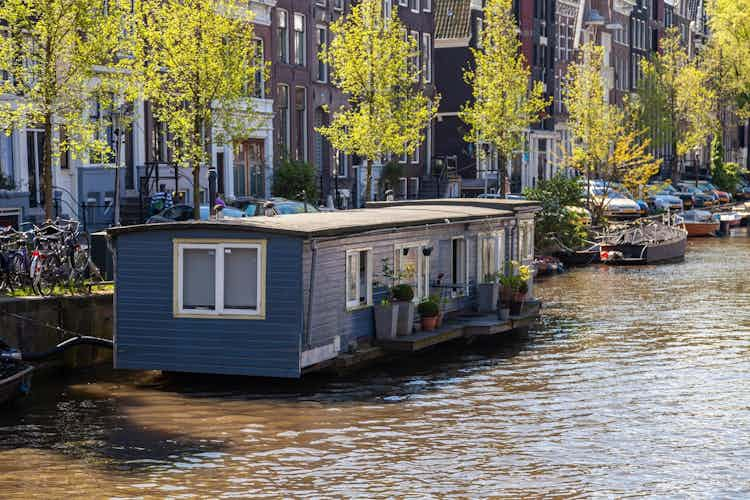Sales in the marine sector are going through the roof.
British Marine, a trade association for the marine industry, reports that sales were up 9% in 2020. These figures also show a whopping 18% increase in the sale of vessels priced over £100,000. While figures for 2021 are not available yet, according to boat brokers, the trend is continuing. So while prices might seem steep, living on the water remains a cheaper alternative to buying a property.
Would you live on the water?
The prospect of sitting waterside as you sip a cold glass of something and watch the boats slide by has an allure that’s difficult to top. Whatever the vista, the view’s always better when there’s some water in it. Until recently, this was something you might do when you went on holiday or imagined as you stood on a packed commuter train. But, since Covid-19 hit, the daydream has become real for many and is easily attainable for a modest stake.
Jonny Baird, Design Director at Bluefield Houseboats, told Pension Times: "Addressing the big challenges of our generation, including housing shortages, flooding and climate change, through innovative products is essential, and houseboats offer a viable and sustainable solution to regenerating and upcycling inaccessible 'bluefield' water sites into usable space.
"Houseboats offer a 'light touch' to waterfront & riverside sites reducing the impact on the environment with minimal permanent infrastructure, which can be further enhanced by employing off-grid and renewable energy options. No compromise on-water living is now a reality where a houseboat can deliver all the comforts of a luxury apartment, perfect for a retirement home.
"The 'blue mind' experience adds to the overall appeal where living on or near water has been proven to reduce stress levels and improve your mental health. Sounds like the ideal solution for those twilight years."
Choosing how you wish to live
When you buy a boat that you plan to live on for long periods, there are many options to consider. Rather than being a disadvantage, this can be a benefit. It gives you a more comprehensive range of possibilities and allows you to pin down what you want.
Broadly speaking, there are two types of boat. The first is a houseboat.
Living on a houseboat
Houseboats are often structures similar to a chalet or mobile home and may be built over more than one floor. It can stand on piles, or it may float on a pontoon. Rather than being a purpose-built structure, a houseboat could also be a marine vessel - like a barge or narrowboat - converted into a home.
One vital point to note is that houseboats are static; they do not move under their own power. Although they may be moveable, doing so requires cranes, lifting, low-loaders, and trailers. Hence, houseboats often come with a mooring. The mooring, however, is not always included in the purchase price, so you may need to rent this separately. This can be a significant factor, and anyone buying a houseboat should look carefully at the costs and terms of a rental before proceeding.
Putting a price on a mooring is difficult. Still, a large houseboat mooring in a good London location (moorings are frequently in desirable postcodes) can cost £18,000 per year. This is an exceptional example, though. High-quality marina moorings tend to average around £500 per metre per year. For this, you would be in a custom-built marina and have access to facilities and services like:
- 240V electrical hook-ups
- Pump out of sewerage services
- Fuel for your stove or generator
- Parking
- On-site security
The drawbacks of living on a houseboat are similar to those of living in a remote country location.
- You won’t have mains gas
- You’re unlikely to have access to mains water
- You’re unlikely to have a mains sewerage system
The last two points are easy to remedy because your houseboat will have a water tank and a holding tank (a type of septic tank). Freshwater will be assessable, too. There is always a freshwater hose close by, and there will be a service where a tanker comes and empties your holding tank every week or so.
The main problem comes when trying to heat your water and keeping warm in colder weather. Most boats are well-insulated, but water tanks can freeze. Banks and pontoons get icy, but you have to continue with the routine of having your tank emptied and filling up with water. Electricity is expensive, so people try to avoid immersion heaters and electrical heating. Most liveaboards have a wood-burning or multi-fuel stove, many of which come with a back boiler that heats the domestic water and radiators.
Other people use bottled gas, and when you live on a permanent mooring, you can save money by buying it in large cylinders. The downside to both solid fuel and gas is that neither is carbon-friendly. Both involve lugging heavy bags or canisters around pontoons or towpaths, especially in winter. Many of the changes being introduced to regulate gas boilers and solid fuel systems do not apply to boats and houseboats. However, not all situations are the same, and you would need to research how they will affect your plans.
Solar and wind power is unlikely to provide you with enough power for all your domestic electricity, heating and hot water. Unless you are consciously conserving energy, a couple would use 8 - 10 kWh per day and need an alternate energy source in the winter. Many people use a generator to boost their domestic batteries and provide 240V electricity but fueling a generator with diesel is costly, polluting, and noisy. With so many different scenarios, it is worth seeking expert help.
When you live in a houseboat, you have a permanent address. You can claim benefits that go toward your accommodation and includes the cost of your mooring. Registering with a doctor is straightforward, as is getting mail or receiving deliveries. You will have to pay council tax and may have to pay river tax of around £500 per year. Check out this overview of living on a boat from Shelter. When you buy, there is no Stamp Duty. Many moorings have car parking, which makes it easier to transport your supplies. Occasionally, a mooring has some land with it, giving you an outside space ashore.
Living on a “liveaboard”
The second option for waterside living is a conventional boat large enough to live aboard for a significant part of the year while having the ability to cruise around.
For a couple to live comfortably, you would need something of around 12 metres (or 40 feet - boats are still often measured in feet and inches) or more. This would give you more space than a large touring caravan and most motorhomes. Many people live permanently on narrowboats, which are about 2 metres (6 feet 6 inches) by 18 metres (60 feet) or on wide beams, which are up to 4 metres (just over 13 feet) across and 18 metres (60 feet) long.
There is a surprisingly large amount of navigable inland waterways in the UK. Although you cannot navigate the entire country, you can do sizable chunks of either the south or the north.
Unfortunately, the connection between the two regions is broken in the Midlands. Still, you can cruise the entire country by transporting your boat between the two systems.
The size and your choice of boat will limit where you can go:
- Narrowboats can navigate most of the UK’s inland waterways
- Wide beams are limited to certain waterways
- Large, liveaboard motor cruisers are pretty much limited to the Thames.
- Neither wide beams nor narrowboats, apart from short hops, can go to sea.
Large motor cruisers can go coastal cruising, but it is recommended that they have two engines and are over 200 horsepower. You would also need to have suitable navigational equipment and have a Day Skipper’s Licence. Motor cruisers can navigate most of the Thames but may not be able to go under some of the lower bridges, particularly on the upper reaches. And so, another thing to consider before buying a boat is where it can and cannot take it and how this fits in with the lifestyle you are looking for.
One advantage for all craft on Britain's inland waterways is that a considerable amount of free mooring is available. Many are situated in quiet, picturesque spots. Boats are permitted to moor at locks overnight for free, and you can stay for two weeks in any of the country’s free moorings. However, if you overstay, you can be moved on. As a consequence of the free mooring, there is a community of people leading a peaceful, nomadic life chugging around the country. You can get a cosy insight into this world by following Mark and Julie on their wide beam ‘Weir on the Move’.
If you decide to go coastal cruising, there are numerous quiet bays, coves, estuaries and harbours around the UK where you can drop anchor and moor at no cost. Coastal marinas offer 240V electrical hook-ups, pump-out services, and access to fuel, while you also get access to Britains loveliest harbours and seaside towns. If you want to winter in one spot, most marinas allow long-term residential use. Many larger marinas are destinations themselves these days, with restaurants, shops, supermarkets, fitness centres, and even hotels and casinos.
Once again, heating and hot water can be problematic. When cruising from place to place, your engines will keep the batteries topped up and heat your water. If you stop away from a marina hook up, you will almost certainly need a generator. This will charge your batteries and provide 240V power while it is running. When it isn’t running, you will be reliant on 12/24V batteries and gas. Solar and wind power will help, but you may struggle during winter.
How much does it actually cost to buy and live on a boat?
The costs of moving to the water are just as variable as the options.
For example, for £169,000, you can buy a fully fitted out 20-metre wide beam permanently moored in Limehouse Basin, London. Mooring fees are £12,000 per year. Up the river in Chertsey, they would be £9,000, and £5,000 in Birmingham. Alternatively, if you can find a farmer’s field next to which you could moor, you could pay as little as a few hundred pounds.
In Chichester harbour, there is a custom-built, 17.5 x 4.5. houseboat. It is new, has all appliances included, a heat recovery system and high spec insulation, and a garden for the berth holders for £375,000.
Similar in size but with less outside space is a newly converted wide beam with oil fire central heating on the river Deben in Ipswich, costing £150,000.
In Brighton Marina, there is an 18 x 4 newly refitted barge for sale at £199,950.
If you want a cruiser, you could pick up an eighteen-year-old, 12-metre, sea-going cruiser that two could comfortably live on at £159,950.
A 1972 river cruise, doer-upper, 12.19-metres long and with plenty of internal space for two, comes in at £39,950.
Are there any disadvantages to living on a boat?
The one significant disadvantage to heading for the water is the adage, “you’ll never lose out if you put your money into bricks and mortar.” Whether it's a boat or houseboat, it's a depreciating asset no matter how much ongoing maintenance you do. For anyone thinking of downsizing, taking to the water can be a unique and low-cost option compared to living in a house, but you are unlikely to make any money from it.
Could a houseboat be the answer to your property search?
Boat or houseboat living means you can get an attractive location, usually in a postcode that may otherwise be beyond your means. Moorings are typically situated in the more beautiful parts of town and help make the place more attractive. The gentrification of urban waters, for good or bad, means that canals, wharves and docks are no longer rat-infested no-mans-lands but upbeat, thriving centres where you are never more than 3 metres from a cappucino. Then you can cruise out into the meadows among willows and church spires receding to the horizon and be in a good place.
It’s certainly worth a thought.
Image Credit: Dim Hou at Unsplash








